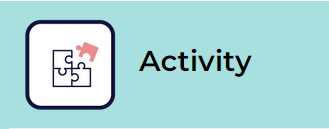Navigation
To navigate through this course, you can use:
- the Contents panel located at the top left. Select it to view the table of contents to navigate across the different modules and sections.
- Previous and Next buttons located at the bottom of the browser to go forward and back.
The materials in this course are designed to be interactive. We have included helpful instructions in italics, before the interactive elements.
Instructional Elements
You will find the following instructional elements throughout the course:
 Self-reflections on your assessment and feedback attitudes and practices. Type your thoughts and ideas into the text boxes. You can download and save a copy of your responses using the export tab.
Self-reflections on your assessment and feedback attitudes and practices. Type your thoughts and ideas into the text boxes. You can download and save a copy of your responses using the export tab.
 Short quizzes that provide immediate feedback on your understanding of key topics. Follow the instructions on each knowledge check to answer the questions.
Short quizzes that provide immediate feedback on your understanding of key topics. Follow the instructions on each knowledge check to answer the questions.
 Guided exercises that involve a deeper analysis of your own assessments. Activities may be completed offline. We encourage you to work with the teaching and learning support centre at your institution for assistance and feedback on these activities.
Guided exercises that involve a deeper analysis of your own assessments. Activities may be completed offline. We encourage you to work with the teaching and learning support centre at your institution for assistance and feedback on these activities.
 Mini presentations of teaching examples that illustrate and reinforce important concepts. Click through the slides to read the entire scenario.
Mini presentations of teaching examples that illustrate and reinforce important concepts. Click through the slides to read the entire scenario.
 Downloadable worksheets to assist with assessment planning and design. Click on the download button to save a copy.
Downloadable worksheets to assist with assessment planning and design. Click on the download button to save a copy.
Course Layout
We recommend that you begin your journey with Module 1, then follow the road that best suits your needs.
- benefits and limitations of traditional assessment strategies
- the forces driving attitudinal shifts towards online assessment in higher education
- a different approach to assessment
- self-reflections on our own online assessment practices
- characteristics and benefits of authentic assessment
- step-by-step process of authentic assessment design
- implementation, evaluation, and feedback strategies for online authentic assessments
- benefits of video, website, infographic, and other media assignments
- step-by-step guidance on the selection and design of digital media assignments
- tools and supports for implementation and evaluation of alternative online assessments
- equitable and inclusive assessment planning and design
- rubric creation
- online feedback strategies

